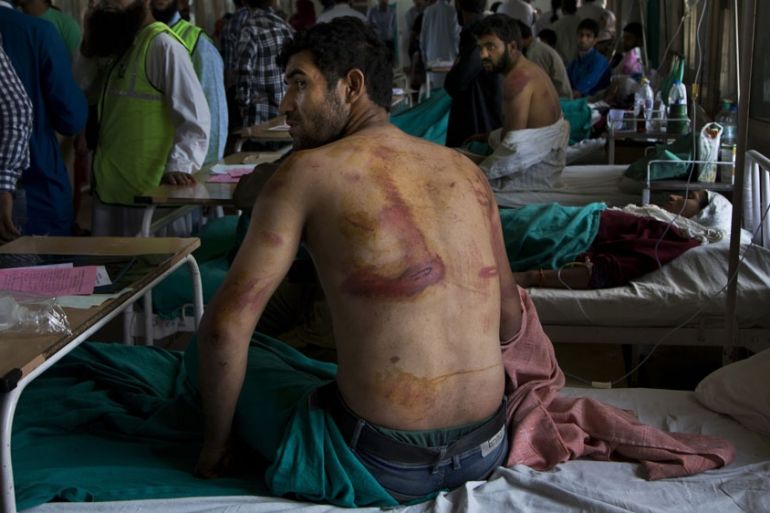Why do states allow impunity for torture?
Torture is criminalised in most countries across the world, yet very few states carry out prosecutions, say experts.

On the International Day in Support of the Victims of Torture, UN Secretary-General Antonio Guterres has urged all states to end impunity for torture.
“The prohibition of torture is absolute – under all circumstances. Yet this core principle is undermined every day in detention centres, prisons, police stations, psychiatric institutions and elsewhere,” he said in a statement on Wednesday.
Keep reading
list of 4 items‘Grim reminder’: Sri Lanka’s Tamils mark 15 years since end of civil war
Georgia’s president vetoes controversial ‘foreign agents’ bill
‘Regime machinery operating efficiently’ as Tunisia cracks down on dissent
The occasion, which falls on June 26 every year, is aimed at honouring victims of torture and reiterating global commitment to eradicating the crime. Guterres said he was encouraged that the world was moving towards universal ratification of the 1984 UN Convention against Torture (CAT).
But states needed to ensure their national laws are in line with the convention in order to move from prohibiting torture from “principle to practice”, he said.
Some 166 countries have ratified the convention, making it one of the most widely ratified international conventions.
|
|
However, despite torture being condemned and criminalised widely, human rights experts say very few countries actually prosecute the offence.
CAT defines torture as “any act by which severe pain or suffering, whether physical or mental, is intentionally inflicted for such purposes as obtaining information or a confession or for any reason based on discrimination of any kind, when such pain is inflicted by a public official or any person acting in an official capacity.”
Crucially, it also obliges states to investigate and prosecute torture, regardless of where the offence occurred. But that happens only rarely, said experts.
Diplomatic dispute
One case that highlights the difficulty of prosecuting torture is the murder of Saudi journalist Jamal Khashoggi. Agnes Callamard, special rapporteur on extrajudicial executions, said on Wednesday that the Saudi government was responsible for the killing, which took place in the kingdom’s Istanbul consulate last October.
She called for an international criminal investigation saying such an inquiry can be launched under CAT, which Saudi Arabia is a signatory to. She recommended that third states exercise jurisdiction over the crimes committed against Khashoggi.
However, experts said such a move was unlikely given Riyadh’s global influence.
Nils Melzer, current UN special rapporteur on torture, said the stigma attached to torture was one reason why third states were reluctant to prosecute torture. Such states realise that any positive precedent they set can later potentially also be used against them.
“A state that claims another state is guilty of torture will risk a diplomatic dispute. Essentially, states are united in condemning torture but states are not prepared to pay the price for implementing the prohibition against torture in actual practice,” he said.
|
|
Accountability was vital in “big cases” such as that of Khashoggi, Melzer said. However, it was exactly in such cases, where the powerful states are threatened, that the rule of law yields to the interests of the powerful.
Rehabilitation
He also said it was problematic that there has not been a single prosecution from the 2014 US Senate Committee report which confirmed the CIA systematically tortured detainees in secret facilities worldwide after the September 11, 2001 attacks.
Sami al-Hajj, director of Al Jazeera’s Centre for Public Liberties and Human Rights, who was once held at Guantanamo Bay where the US military imprisoned and tortured hundreds of men on “terror” charges, said Guantanamo detainees have not received justice or reparations.
“States should prioritise the rehabilitation of torture victims in cases where, for example, victims have become mentally ill as a result of torture,” said al-Hajj.
Melzer, meanwhile, lamented states’ persecution of individuals who expose torture.
He lamented that Julian Assange, the founder of Wikileaks, who helped expose US military’s actions in Iraq and Afghanistan, including the killing of civilians, was now being prosecuted on espionage charges, while there has been no justice for the crimes he helped expose.
Melzer said in order to achieve the goal of eradicating torture, it was particularly important for civil society to step in and mobilise public opinion to put pressure on states to prosecute torture.
“The public cannot be complacent about this policy and governance failure. It is important that the public realise that if we continue to be complacent about the big cases not being prosecuted, our own rights may well be ‘next in line’.”